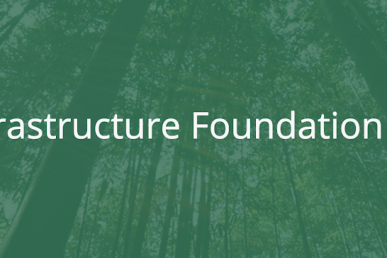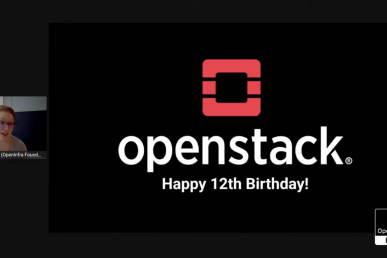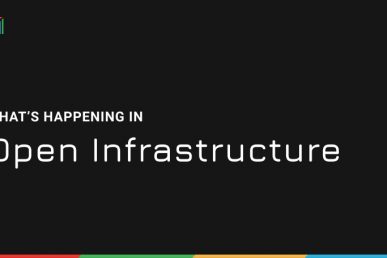The Open Infrastructure (OpenInfra) community had a strong year in spite of the unprecedented global challenges in 2020. While the global community was not able to meet in person, everyone still convened to discuss how we collaborate to deliver the OpenInfra mission: building communities who write software that runs in production.
OpenInfra User Groups Growth
In 2019, OpenInfra User Groups migrated to the Meetup Pro platform, which allowed the groups more visibility on the web, as well as a streamlined way to organize and communicate.
In 2020, we saw the number of groups grow past 40, adding communities in places like the Congo and Tijuana.
Amidst challenging circumstances, User Groups showed their commitment to community, organizing in new and unique ways. When in-person events were put on hold, several groups took on the task of hosting virtual meetups covering a variety of topics including hybrid cloud, storage, containers, and edge. Some groups even organized watch parties for the first virtual OpenInfra Summit that took place in October.
While we know User Groups are looking forward to meeting in person again, we’re sure that virtual meetups are still going to be around because of the valuable accessibility they provide so many community members around the world.
Outreachy Program
For the current round, December 2020 to March 2021, 5 interns were selected:
- Kuryr: T.I. Fasoyin from Nigeria
- Manila: Dina Saparbaeva from Karakol, Kyrgyzstan
- Ironic / OpenStack SDK: Anuradha from India
- Ironic: Oluwatosin Farai from Nigeria
- Manila: Paulali from Kenya
Students in OpenStack
Students are the future- the future of the workforce, the future of the tech industry and the future of open source. The OpenStack community has been slowly building relationships with more and more universities, getting them involved in work upstream in the community. These relationships are mutually beneficial; students get practical experience and build skills in communication and working collaboratively and the OpenStack community gets fresh perspective and the excitement that comes with new contributors.
Boston University Senior Design Program
Three students- Nicole Chen, Ashley Rodriguez, and Mark Tony- at Boston University selected OpenStack Manila as their senior design project. With the help of community mentors- Goutham Pacha Ravi, Victoria Martinez De La Cruz, Jeremy Freudberg, Maari Tamm and Kendall Nelson- the students have begun working on implementing the Manila APIs in the OpenStackSDK. There is a community effort to reach feature parity between the individual python clients for OpenStack services and the OpenStackSDK. The students were onboarded into the community, they have begun attending community meetings, and they also have been working on the specification outlining the work they are beginning and the details of implementation. If they are able to complete all the work in the OpenStackSDK, they can then begin implementing those features in the OpenStack Client. They will continue their work for the remainder of their school year, wrapping up in May of 2021.
North Dakota State University Capstone Program
For several years now, we have participated in North Dakota State University’s Capstone program that gives students a chance to select a project- either open source or industry- to work on throughout the spring semester. At the start of 2020, the OpenStack community had four students- Dawson Coleman, Luke Tollefson, Noah Mickus, and Steven Glasford- helping to add support for configuring TLS ciphers and protocols on Octavia load balancers. Michael Johnson, Adam Harwell, and myself mentored students through their semester helping them learn not only about Octavia, but about OpenStack, and open source. With their hard work, they landed TLS cipher and protocol support before the end of the Ussuri release and it became a large part of the promotion and marketing around that release. The rest of their work landed shorty after feature freeze and was included in the Victoria release that happened in October of 2020.
Oregon State University Internship
This year the Foundation started a partnership with Oregon State University funding one student to work in the OpenStack community on the Glance project to give them real world experience working on an open source project. Kendall Nelson and Erno Kuvaja mentored Khuong Luu. He worked on a variety of tasks in Glance. Khuong made several documentation improvments including adding missing information and reording topics to make them more readable and the information more discoverable. He cleaned up config options that were causing orphan processes in Glance when a user sent a SIGHUP signal. Khuong also cleaned up a bug being caused my a missing image property. While he didn’t spend time on one large feature, his efforts cleaned up a lot ot technical debt. He finished up his internship when the school year concluded and we thank him for all his hard work!
We have a new student intern getting started with his onboarding process. Ryan Zimmerman, once up to speed on OpenStack and our community, wil begin work on the OpenStackSDK and helping OpenStack services reach feature pairity with their own project specific python clients.
OpenStack Upstream Institute
The OpenStack Upstream Institute (OUI) training is an interactive course that teaches attendees about how the OpenStack community operates including the community structure and processes. The training also includes hands-on practice to teach participants how to use the tools that the community depends on. These tools -such as Git, Gerrit, and more – are maintained by the OpenDev (https://opendev.org) community. As in person events were not possible during 2020, we had to re-invent OUI to make it suitable for being hosted in a virtual format.
The virtual training had a slightly different structure compared to the in person classes. The training was split into two 3-hour long blocks: OpenStack specifics and OpenDev tools. The OpenStack module covered items such as governance, OpenStack release cycles, ways to communicate within the community, and more. The attendees learned how the community operates as we went through the topics during the first block. The class utilized active synchronous conversation between students and mentors, where attendees are able to ask questions from our mentors, who are all active community members.
The OpenDev tools module was also a hands-on class that focused on teaching attendees to setup and use tools that are used for software and documentation development processes as well as task tracking. Many of these tools are used by multiple OpenInfra communities and adjacent projects. By organizing this way, we were able to welcome and educate students who might not have an interest in OpenStack specifically which gave us a broader audience. During the class the attendees worked through exercises with guidance from the mentors to give them practice using the tools. During the training we also had breakout rooms students and mentors could hop into to ensure any technical issues students had were solved before the end of the class.
OUI, with the new structure, was held during the OpenInfra Summit in October. The class material was also utilized at other events to hold the training in different formats. Ghanshyam Mann hosted a virtual OUI session before the Summit and Amy Marrich led a group of over 15 mentors to educate participants of the Grace Hopper Conference’s Open Source Day on how to get started in OpenStack.
Press & Analyst Highlights
Public relations efforts are led by a distributed team of professionals in the United States, Europe, and Asia Pacific. This team engaged analysts and journalists worldwide in dialogue, proactively delivering news, commentary, and contributed byline content for both the Foundation and for its individual projects. Community news highlights are available at https://openstack.org/news.
Key media relations initiatives included the following:
- Launch of the OpenInfra Foundation
- Project software releases including OpenStack Ussuri and Victoria, Kata Containers 2.0, and StarlingX 4.0
- Virtual OpenInfra Summit
- Virtual OpenDev event
- Celebration of the OpenStack project’s 10th anniversary
- Momentum of OpenInfra projects in the broad OpenInfra and cloud IT landscape
Analysis shows that OpenStack/OpenInfra Foundation news coverage comprised more than 24,100 total placements in 2020. Media coverage was distributed globally (31% APAC, 30% North America, 22% Europe, by volume), and extended into 94 countries.
As evidenced by the highlights shared below, media attention has shifted from questions about OpenStack’s future to an active interest in use cases and the progress of the other projects supported by the OpenInfra Foundation.
In 2020, the OpenInfra Foundation adopted a virtual briefing format, shifting from in-person analyst day sessions at the physical events. During the course of the year, Foundation staff leadership conducted briefing sessions with more than two dozen analysts in Asia, North America, and Europe, providing updates on both the evolution of the Foundation’s business model and the status of individual projects in the organization’s portfolio. Firms with strong ongoing interest in our community’s work include IDC, Forrester, Redmonk, 451 Research, and others.
Analyst interest in the community’s work has shifted steadily since the early days of the Foundation. While early coverage necessarily focused on the OpenStack project, the focus has broadened substantially to include other projects under the OpenInfra Foundation. Additionally, coverage has shifted to include OpenInfra Foundation projects as components of broad-based solutions that leverage OpenInfra technologies such as Kubernetes.
Superuser
The OpenInfra Foundation continued to support the popular Superuser publication, covering the OpenInfra ecosystem news, case studies, event recaps, product updates and announcements, project release and more. In 2020, superuser has reached more than 150,000 unique visitors from 193 countries. Editors and contributors are members of the OpenInfra Foundation, the OpenStack and adjacent open source communities, and professional journalists.
Looking forward to 2021…
Thank you to everyone in the OpenInfra community for all of the work that went into 2020 and is continuing in 2021 to contribute and support the community! Check out the full 2020 Annual Report and join the OpenInfra community to build the next decade of OpenInfra.
- Inside Open Infrastructure: October 2024 - October 2, 2024
- Inside Open Infrastructure: June 2024 - June 18, 2024
- Inside Open Infrastructure: April 2024 - April 3, 2024

)










